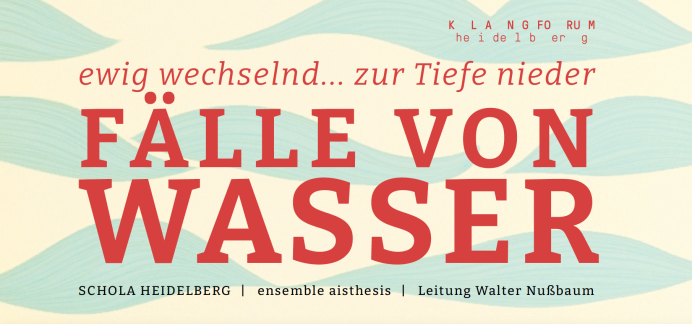eternally changing...down to the depths
falls of water
Betriebswerk

- Premiere — Shih-Hui Chen : Where Water Falls , 2025
Komposition:
- Franz Schubert : Gesang der Geister über den Wassern D. 538 , für 4 Männerstimmen, Text von J.W.v.Goethe (1779) , 1817
- Franz Schubert : Gesang der Geister über den Wassern D. 714 , für 8 Männerstimmen und tiefe Streicher , 1821
- Franz Schubert : Flucht , für 3 Männerstimmen , 1825
- Franz Schubert : Gesang der Geister über den Wassern / Liedfragment D 484 , für Bass und Klavier , 1816
- SCHOLA HEIDELBERG
- ensemble aisthesis
Leitung: Walter Nußbaum
The project combines works of literature and music from different centuries on an aesthetic-philosophical, ecocritical and artistic level to create a philosophical-transcultural discourse on cases of water.
The combined works by the Taiwanese-American composer Shih-Hui Chen (*1962) and the Austrian composer Franz Schubert (1797-1828) refer equally to literary models:
Chen to poems by Li -Bai (aka "Li Taibo") 701-762, Su Shi 1037-1101 and Zhang Jiuling, 673?-740 about a waterfall on the legendary Chinese cultural mountain Lushan, Schubert's "Gesang der Geister über den Wassern" to Johann Wolfgang von Goethe's six-stanza poem of the same name from 1779, inspired by the Staubbach Falls in Lauterbrunnen, Switzerland.
The event will look at different re-mediations of the Goethe poem in Schubert's work by including several early settings, which will be performed in various scorings (from the fragment of an art song for baritone and piano to quartets for male voices with and without accompaniment to the unusual final version[1] for four low string instruments and eight male voices D 714 from 1821, a solitaire in the concert repertoire in this scoring).
Finally, Shih-hui Chen's composition fits into this cycle:
I did some research and thought about writing my piece under the influence of Schubert's setting of Goethe's text. The images and meanings in Goethe's text remind me of three Chinese poems inspired by the waterfall of Mount Lu. Like Goethe's muse, the Staubbach Falls, these poems convey a deep, spiritual connection to nature that transcends time and cultural boundaries. (Shih-Hui Chen, 05.11.2024)
On 2.7.2025 14.00-15.30 there will be a Digital Dialogue between the composer CHEN Shih-hui, Marc J. Reichow (KlangForum Heidelberg), Rolf Scheuermann (Buddhology, Environmental Humanities) and Barbara Mittler (Worldmaking-A Dialogue with China: Epochal Lifeworlds, Narratives of Crisis and Change), reflecting on the different perspectives. To receive the link to the event, please register at: xiaojie.chang@zo.uni-heidelberg.de.
[1] composed from 1816, published posthumously; D484 as well as D538, D704, D705)
